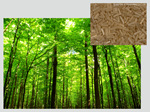Cellulose Fiber Reinforced PP Targets Automotive
The material is seen as a suitable candidate for use in door module carriers, center consoles, and armrest cores.

Launched by Polyplastics Group last year, a long cellulose fiber reinforced PP is being targeted at such automotive applications as door module carriers, center consoles, and armrest cores. Plastron LFT PP reportedly has been shown to offer lower density and reduced greenhouse gas (GHG) emissions than short glass-reinforced resins while delivering the same mechanical properties.
A non-edible biomass raw material derived from organic non-fossil resources, cellulose boasts characteristics such as, negative carbon influence (absorbs carbon dioxide in the air when manufactured) and is sustainable (raw material that can be procured sustainably unlike resources such as natural minerals). Plastron LFT, specifically, incorporates regenerated cellulose fibers made using the solvent method which produces hardly any waste. Polyplastics uses a solvent method cellulose fiber that is said to emit less greenhouse gas when manufactured compared to typical glass fiber. Since it has nearly 10% lower density than glass fiber reinforced PP resin, its greenhouse gas emissions are also even lower when compared in equal volumes.
A significant majority of typical regenerated cellulose is manufactured using a complex process which involves modification of the cellulose followed by dissolving in solvent and spinning and finally restoring the original cellulose form. This process results in significant emissions of greenhouse gases including carbon dioxide. In contrast, the solvent method used by Polyplastics is a closed process that reportedly recovers virtually 100% of the solvent. It generates minimal waste and produces materials that are even more eco-friendly. The company has earned multiple patents throughout the world for resins reinforced with long-regenerated cellulose fiber, including solvent method cellulose fiber.
Related Content
-
Formulating LLDPE/LDPE Blends For Abuse–Resistant Blown Film
A new study shows how the type and amount of LDPE in blends with LLDPE affect the processing and strength/toughness properties of blown film. Data are shown for both LDPE-rich and LLDPE-rich blends.
-
New Entrant Heartland Polymers Stepping up as Reliable Supplier
Heartland Polymers’ new Alberta, Canada facility will produce 525 KTA propylene and 525 KTA polypropylene. It is expected to stabilize supply chains across the continent.
-
The Fundamentals of Polyethylene – Part 1: The Basics
You would think we’d know all there is to know about a material that was commercialized 80 years ago. Not so for polyethylene. Let’s start by brushing up on the basics.
.png;maxWidth=970;quality=90)












